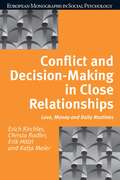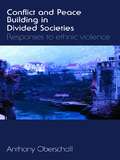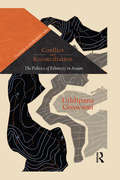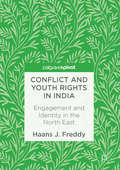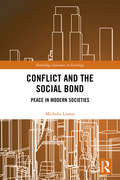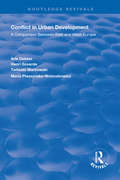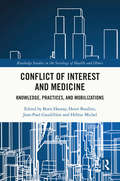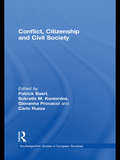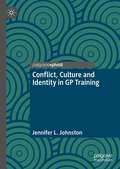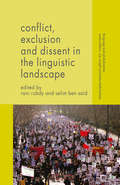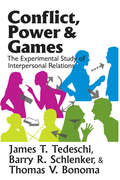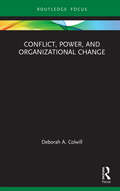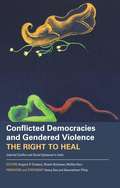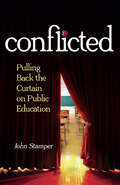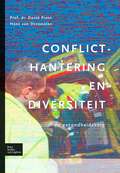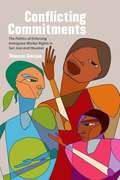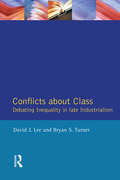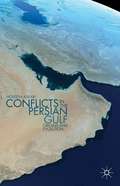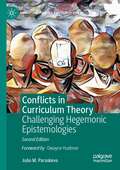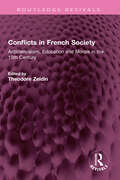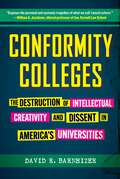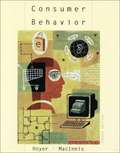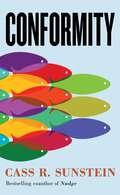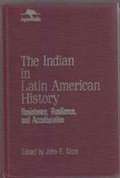- Table View
- List View
Conflict and Decision Making in Close Relationships: Love, Money and Daily Routines (European Monographs in Social Psychology)
by Erich Kirchler Christa Rodler Erik Holzl Katja MeierLove and money are important aspects of the everyday lives of couples. This book focuses on the daily routines of disagreement, conflict and joint decisions on these, and other issues such as work, leisure and children, create in the household.Central to the authors' research is a unique diary study of forty couples, who kept a daily record of their joint decisions over the course of a year. The diaries show how challenging, varied and complex the conflicts and decision making of normal everyday life can be and reveal that goals frequently change during the decision-making process with the result that the final outcome often achieves a goal distinct from the original intention. Furthermore, the dynamics of decision making differ according to the problem at stake, the decision-making history of the couple, and the quality of the partnership. The results of the diary study are discussed within the overall context of current research in the field as a whole, including discussion of joint decision-making case studies, close relationships, decision-making research in general and special research methods. Numerous results of psychological, sociological, economic and consumer behaviour studies are summarised and integrated into a model of household decision-making. This book will be primarily of interest to students and researchers in social psychology and economic psychology, but its interdisciplinary and applied nature will also make it of relevance to professionals working in the fields of family therapy and consumer behaviour.
Conflict and Peace Building in Divided Societies: Responses to Ethnic Violence
by Anthony OberschallThis groundbreaking book provides an integrated account of ethnic, nationality and sectarian conflicts in the contemporary world including the role of collective myths, the mass media and the ethnification of identities as contributors to ethnic conflicts and wars. In addition to many examples from the last two decades, Oberschall provides a comprehensive overview of the conflict and peace processes in Bosnia, Northern Ireland and the Middle East. Oberschall analyzes: peace building through constitutional design power sharing governance disarming combatants, post-accord security and refugee return transitional justice (truth and reconciliation commissions, war crimes tribunals) economic and social reconstruction in a multiethnic society. In addition to many examples from the last two decades, Oberschall provides a comprehensive overview of the conflict and peace processes for Bosnia, Northern Ireland, and Israel-Palestinians. He argues that insurgency creates contentious issues over and above the original root causes of the conflict, that the internal divisions within the adversaries trigger conflicts that jeopardize peace processes, and that security and rebuilding a failed state are a precondition for lasting peace and a democratic polity. This book will be essential reading for undergraduate and postgraduate students, researchers and academics interested in the fields of peace studies, war and conflict studies, ethnic studies and political sociology.
Conflict and Reconciliation: The Politics of Ethnicity in Assam (Transition in Northeastern India)
by Uddipana GoswamiDiverging from reductionist studies of Northeast India and its multifarious conflicts, this book presents an exclusive and intricate, empirical and theoretical study of Assam as a conflict zone. It traces the genesis and evolution of the ethnic and nationalistic politics in the state, and explores how this gave birth to nativist and militant movements. It further discusses how the State’s responses seem to have exacerbated rather than mitigated the conflict situation. The author proposes ethnic reconciliation as an effective way out of the current chaos, and finds the key in examining the relations between three communities (Axamiyā, Bodo and Koch) from Bodoland, the most violent region of Assam. She stresses upon the need to redefine ‘Axamiyā’, an issue of much discord in Assam’s ethnic politics since the modern-day formulation of the Axamiyā nation. The book will prove essential to scholars and students of peace and conflict studies, sociology, political science, and history, as also to policy-makers and those interested in Northeast India.
Conflict and Youth Rights in India: Engagement and Identity in the North East
by Haans J. FreddyThis book examines how conflict has affected the rights of youth in northeast India. Examining youth engagement in protracted conflict and its impact on the rights of youth in north east India, the author considers the complex issues besieging the region, including armed insurgency, conflicts between ethnic groups, human rights violations, poor governance and a lack of economic development, all factors contributing to the lack of growth in the region, and a consequent sense of alienation from the Indian mainstream. Moving beyond considering North East India as a theatre of insurgency, this pivot offers an alternative understanding of youth unrest in India and issues of non-representation in terms of rights and ethnic, national and cultural identities.
Conflict and the Social Bond: Peace in Modern Societies (Routledge Advances in Sociology)
by Michalis LianosIs violent conflict inevitable? What is it in our social nature that makes us conduct wars, genocides and persecutions? The answer lies in how we are programmed to bond and form communities that demand loyalty in order to let us belong. The analysis in this book cuts through the social sciences in order to show the fundamentals of violent conflict. The book investigates conflict at the level of sociality. It reorganises existing theories of conflict under that perspective and brings them to bear upon the link between violence and togetherness. It introduces the key concept of closure to describe the conditions under which human groups start to perceive their position as similar and their reality as polarised. This is how normality starts breaking down and fault lines appear. Violent conflict is then analysed as a reaction that seeks change more rapidly than conditions seem to allow. Global comparative data from numerous studies – including M. Mousseau's works – are used to disentangle the factors that contribute to "democratic peace", that is, the fact that democratic societies do not go to war with each other. This inquiry reveals the new dimension of sociodiversity, which allows societies where individuality is strong to constantly produce alternatives and avoid closure. The book concludes with a coda on peace and sociodiversity which explains how contemporary societies can ensure durable peace and adequate social justice at the same time. Written in a clear and direct style, this volume will appeal to students, researchers and scholars with an interest in political sociology, anthropology, international relations, war studies, as well as conflict and peace studies.
Conflict in Urban Development: A Comparison Between East and West (Routledge Revivals)
by Henri Goverde Arie Dekker Tadeusz Markowski Maria Ptaszynska-WoloczkowiczPublished in 1992, the aim of this book is to give both the professional planner and the student a feel for the current arguments alive in planning policy circles and to introduce relevant contemporary research. This book has developed out of a series of seminars run at the Institute of Planning Studies at Nottingham University as part of its continuing professional development programme. Each of the seminars brought together a variety of speakers who were involved with the topic under discussion from a different aspect – some with academic research experience and others with practical policy implementation. Most the nineteen contributors presented papers at this series of seminars, but some have been rewritten, others substantially revised, and several have been commissioned especially for this book. Four current policy issues are examined: provision and pedestrians; jobs for the inner cities; the homeless and the relationship between planners and developers. For each topic contributors were chosen who could approach the problem from a different point of view, the aim being to explore each topic with direct statements and straightforward arguments leading therefore to a more stimulating breadth of this view rather than a bland overview.
Conflict of Interest and Medicine: Knowledge, Practices, and Mobilizations
by Jean-Paul Gaudillière Boris Hauray Henri Boullier Hélène MichelIn the context of a growing criticism on the influence of the pharmaceutical industry on physicians, scientists or politicians, Conflict of Interest and Medicine offers a comprehensive analysis of conflict of interest in medicine anchored in the social sciences, with perspectives from sociology, history, political science, and law. Based on in-depth empirical investigations conducted within different territories (France, the European Union, and the US) the contributions analyze the development of conflict of interest as a social issue and how it impacts the production of medical knowledge and expertise, physicians’ work and their prescriptions, but also the framing of health crises and controversies. In doing so, they bring a new understanding of the transformations in the political economy of pharmaceutical knowledge, the politicization of public health risks and the promotion of transparency in science and public life. Complementing the more normative and quantitative understandings of conflict of interest issues that dominate today, this book will be of interest to researchers in a broad range of areas including social studies of sciences and technology, sociology of health and illness, political sociology and ethics. It will be also a valuable resource for health professionals, medical scientists or regulators facing the question of corporate influence.
Conflict, Citizenship and Civil Society (Studies in European Sociology)
by Carlo Ruzza Partick Baert Sokratis M. Koniordos Giovanna ProcacciThis book provides readers – students, researchers, academics, policy-makers, activists and interested non-specialists – with a sophisticated understanding of contemporary discussion, analysis and theorizing of issues pertaining to conflict, citizenship and civil society. It does so through thirteen pieces of most recent in-depth sociological research that delve on: challenges to citizenship, civil society and citizenship in early and late modernity, the reflexive imperative in transformations of civil society, social conflict challenges to social science approaches, methodology and explanatory power, gender, minorities-immigrants-refugees and the extension of citizenship, violence in modernity, the place of civil society for sociology, and postcolonialism, trauma, and civil society.
Conflict, Culture and Identity in GP Training
by Jennifer L. JohnstonThis book explores the identity work and conflicted perspectives of general practitioner (GP) trainees working in hospitals in the UK. Drawing on empirical and theoretical scholarship, and privileging the analysis of social language-in-use, Johnston describes primary care medicine as a separate paradigm with its own philosophy, identity and practice. Casting primary and secondary care in historical conflict, the perceived lower status of primary care in the world of medicine is explored. Significant identity challenges ensue for GP trainees positioned at the coalface of conflict. Problematising structures of GP training and highlighting how complex historical power dynamics play out in medical training, the author advocates for radical change in how GPs are trained in order to manage the current primary care recruitment and retention crisis.
Conflict, Exclusion and Dissent in the Linguistic Landscape (Language and Globalization)
by Rani Rubdy Selim Ben SaidThis book explores the dynamics of the linguistic landscape as a site of conflict, exclusion, and dissent. It focuses on socio-historical, economic, political and ideological issues, such as reflected in mass protest demonstrations, to forge links between landscape, identity, social justice and power.
Conflict, Power, and Games: The Experimental Study of Interpersonal Relations
by James T. TedeschiThe technological revolution in the social sciences made available a set of research tools and data manipulation techniques that permit the study of complex social processes previously inaccessible or not amenable to our observational powers. One important set of tools took the generic title "experimental games," which were characterized by the interactive protagonists' pursuit of relatively well-defined goals whose achievement is dependent on the behavior of others. James T. Tedeschi, Barry R. Schlenker, and Thomas V. Bonoma, in this work, explicate these highly structured interactions.The grand strategy of scientific inquiry is the development of explanatory systems for natural phenomena. The empirical tactics devised to manipulate, control, observe, and measure events or processes of interest often require as much ingenuity and imagination as theory development itself. Generally the situation is so structured that certain rules govern participant behavior. Within these constraints the social psychological processes of conflict, influence, power, bargaining, and coalition formation can be studied. Concerned with the more formal and technical aspects of games, the authors explain how they are used for purposes of developing and testing scientific theory. The emphasis throughout is on the development and empirical evaluation of a scientific theory of social influence and power in situations where the interests of the interacting parties are in conflict.Experimental games have provided many of the concepts and the preponderance of evidence that have helped to unravel many of the complexities of social behavior. In Conflict, Power, and Games, the authors build a bridge between technical and non-technical approaches in order to shed greater light on interpersonal relations.
Conflict, Power, and Organizational Change (ISSN)
by Deborah A. ColwillA capacity for learning, adapting, and changing is an important facet of organizational resilience. What is involved in generative organizational change? Is it an event, a process, or constantly ongoing? What makes organizational change "good" for the organization? Who has the power to decide what is "good" for the organization and its members? How is it decided? What if there is strong disagreement or conflict? How is that handled? What is the role of organizational members and leaders in these discussions? As these questions demonstrate, the triad of change, power and conflict are intimately linked. The purpose of this book is to explore the topics of change, power and conflict as they relate to the experiences of everyday organizational life. It will provide readers the opportunity to reflect critically on their own local experience and involvement in organizations and to glean actionable wisdom for meaningful engagement and impactful contributions to their organization(s) in the present and future.Conflict, Power, and Organizational Change will be of interest to students, researchers, academics and professional colleagues interested in the fields of business and organizational studies, especially those wanting to get acquainted with the concepts of change, power and conflict in contemporary organizational settings.
Conflict, Power, and Organizational Change (Routledge Focus on Business and Management)
by Deborah A. ColwillA capacity for learning, adapting, and changing is an important facet of organizational resilience. What is involved in generative organizational change? Is it an event, a process, or constantly ongoing? What makes organizational change "good" for the organization? Who has the power to decide what is "good" for the organization and its members? How is it decided? What if there is strong disagreement or conflict? How is that handled? What is the role of organizational members and leaders in these discussions? As these questions demonstrate, the triad of change, power and conflict are intimately linked. The purpose of this book is to explore the topics of change, power and conflict as they relate to the experiences of everyday organizational life. It will provide readers the opportunity to reflect critically on their own local experience and involvement in organizations and to glean actionable wisdom for meaningful engagement and impactful contributions to their organization(s) in the present and future. Conflict, Power, and Organizational Change will be of interest to students, researchers, academics and professional colleagues interested in the fields of business and organizational studies, especially those wanting to get acquainted with the concepts of change, power and conflict in contemporary organizational settings.
Conflicted Democracies and Gendered Violence: Internal Conflict and Social Upheaval in India
by Edited by Angana P. Chatterji Shashi Buluswar Mallika KaurThe Sexual Violence and Impunity in South Asia research project (coordinated by Zubaan and supported by the International Development Research Centre) brings together, for the first time in the region, a vast body of research on this important - yet silenced - subject. Six country volumes (one each on Bangladesh, Nepal, Pakistan, Sri Lanka, and two on India, as well as two standalone volumes) comprising over fifty research papers and two book-length studies, detail the histories of sexual violence and look at the systemic, institutional, societal, individual and community structures that work together to perpetuate impunity for perpetrators. The essays in this volume focus on Nepal, which though not directly colonized, has not remained immune from the influence of colonialism in its neighbourhood. In addition to home-grown feudal patriarchal structures, the writers in this volume clearly demonstrate that it is the larger colonial and post-colonial context of the subcontinent that has enabled the structuring of inequalities and power relations in ways that today allow for widespread sexual violence and impunity in the country - through legal systems, medical regimes and social institutions. The period after the 1990 democratic movement, the subsequent political transformation in the aftermath of the Maoist insurgency and the writing of the new constitution, has seen an increase in public discussion about sexual violence. The State has brought in a slew of legislation and action plans to address this problem. And yet, impunity for perpetrators remains intact and justice elusive. What are the structures that enable such impunity? What can be done to radically transform these? How must States understand the search for justice for victims and survivors of sexual violence? The essays in this volume attempt to trace a history of sexual violence in Nepal, look at the responses of women's groups and society at large, and suggest how this serious and wide-ranging problem may be addressed.
Conflicted: Pulling Back the Curtain on Public Education
by John StamperAt what point can a Christian teacher no longer be part of a public education system that requires them to participate in teaching destructive ideologies and advancing immoral agendas on young children? John Stamper reached that tipping point as a teacher in the Chicago Public School System and made the decision to quit his job and pull back the curtain on what’s happening in public schools today. You’ve seen the stories on the news – our national education system has an agenda, being implemented under the guise of fairness, equality, and racial justice to children. However, this book will open your eyes to: The indoctrination process through mandatory teacher training that implements these radical ideologies in schools without parental knowledge The danger and division created by critical race theory and gender theory being promoted in public schools How Marxist, socialist, and communist ideologies are dominating public schools, and how you move forward with homeschooling your children For generations, teachers have been excellent role models, investing their time and energy into fundamental lessons. However, today a growing number think they, the school board, and their school system know more than parents about what should be taught to students. You need to know what is going on in your child’s school and be prepared for the conflict of values that you may have to face. You have options.
Conflicthantering en diversiteit
by David Pinto Hans DoremalenAmbulance personeel aangevallen', lees je in de krant. Ongelooflijk dat dit in Nederland gebeurt, is de maatschappelijke opvatting. In de gezondheidszorg komen confrontaties geregeld voor. Waar komen dit soort conflicten vandaan, wat zijn de oorzaken en vooral hoe voorkom je ze? Het doel van dit boek is het inzichtelijk maken van conflicten waarbij diversiteit een rol speelt. Waarom en waarin zijn deze conflicten zo bijzonder? En hoe kun je er effectief mee omgaan? Interculturele contacten, bijvoorbeeld in de gezondheidszorg, kunnen tot onzekerheid leiden.Dit boek beschrijft de structuur van regels en codes voor communicatie en gedrag, en de normen en waarden die aan die regels en codes ten grondslag liggen. In deel 2 wordt aan de hand van herkenbare casuïstiek eerst een analyse gemaakt van de situatie en vervolgens een richtingwijzer gegeven met praktische handvatten.
Conflicting Commitments
by Shannon GleesonIn Conflicting Commitments, Shannon Gleeson goes beyond the debate over federal immigration policy to examine the complicated terrain of immigrant worker rights. Federal law requires that basic labor standards apply to all workers, yet this principle clashes with increasingly restrictive immigration laws and creates a confusing bureaucratic terrain for local policymakers and labor advocates. Gleeson examines this issue in two of the largest immigrant gateways in the country: San Jose, California, and Houston, Texas. Conflicting Commitments reveals two cities with very different approaches to addressing the exploitation of immigrant workers-both involving the strategic coordination of a range of bureaucratic brokers, but in strikingly different ways. Drawing on the real life accounts of ordinary workers, federal, state, and local government officials, community organizers, and consular staff, Gleeson argues that local political contexts matter for protecting undocumented workers in particular. Providing a rich description of the bureaucratic minefields of labor law, and the explosive politics of immigrant rights, Gleeson shows how the lessons learned from San Jose and Houston can inform models for upholding labor and human rights in the United States.
Conflicts About Class: Debating Inequality in Late Industrialism
by Bryan S. Turner David J. LeeIn recent years there has been growing debate among sociologists about the concept of class and its relevance to the highly industrialised world of the late twentieth century. This book makes available in a single volume all of the key contributions to this debate and takes it a step further with a number of specially commissioned pieces. An editorial introduction which sets the main arguments in context, additional commentary and two alternative conclusions help to make this a unique text for a subject that remains crucial yet highly contentious.
Conflicts In The Persian Gulf
by Hossein AskariAnalyzing the origins of conflicts and wars in the Persian Gulf, this study assesses the conflicts' shared trajectories and fallouts. Although the origins of conflicts are varied (sectarian, religious, ethnic, and tribal, over territory and over resources), as conflicts evolve, the quest for "revenge" and the desire to settle old scores is only one, apparent fuel, which belies a more essential one. The evolution of most conflicts can, over time, be traced to a single source the struggle for power and control over resources. Hossein Askari argues that reconciliation will require the simultaneous adoption of foundational political, social, and economic reforms by the countries in the region, as well as the cooperation of the global powers, especially the United States, to end support of dictators and reduce the human costs of aggression. The creation of a just society with freedom and equal opportunities for all is a necessary precondition if peace and prosperity are to flourish. "
Conflicts in Curriculum Theory: Challenging Hegemonic Epistemologies (Education, Politics and Public Life)
by João M. ParaskevaSince its original publication, Conflicts in Curriculum Theory has firmly established itself as the key volume that not only advanced alternative ways to think about education and curriculum but also introduced innovative scholarship and a radical conceptual grammar for the field. In this revised second edition, Paraskeva addresses current epistemological shifts and avenues within and beyond counter-dominant Eurocentric curriculum perspectives. In this second edition, which includes a new introduction, he provides a critical examination of the modern Eurocentric curriculum and introduces readers to new theoretically rich concepts of "curriculum momentism," "curriculum involution", and "curriculum Occidentosis", pushing the curriculum debate far beyond the classical Eurocentric matrix.
Conflicts in French Society: Anticlericalism, Education and Morals in the 19th Century (Routledge Revivals)
by Theodore ZeldinFirst published in 1970, Conflicts in French Society is a detailed study of the social history of anticlericalism. Its four chapters, based on original research, reinterpret the causes and extent of some traditional conflicts in modern French society. In ‘The Conflict of Moralities,’ Theodore Zeldin investigates the confession to discover what sins and pleasures of daily life were revealed and repressed by it. This provides rare insight into sexual behaviour in nineteenth-century France. In ‘The Conflict in Education,’ Robert Anderson shows us how different the pupils of church and state schools really were and challenges the view that the two systems divided France into hostile camps. In ‘The Conflict in Politics,’ Austin Gough describes the way the church organized a political following, and how the Bonapartists fought back. In ‘The Conflict in Village Life,’ Roger Magraw studies popular anticlericalism at the local level and shows how ideology was far from being the major cause of it. In doing so, he provides an intimate picture of village life. This book will be of interest to sociologists of religion and educationists as well as to those wishing to understand the politics and morals of France.
Conformity Colleges: The Destruction of Intellectual Creativity and Dissent in America's Universities
by David R. BarnhizerThe United States' education system, especially its universities, is under attack by the ideological Left, dominated by advocates of Wokeism and Critical Race Theory. Marshall McLuhan was a brilliant thinker best known for his insight that &“the medium is the message." Universities, as well as our entire educational &“medium&” including the K-12 system that feeds its graduates into the university and societal systems, are powerful and overarching mechanisms that we use to shape our understanding. For Western nations, the ideal of the university and of education generally has been to provide us with analytical skills, knowledge, and the ability to create and nurture a healthy society that benefits as many people as possible. That ideal, and the university as educational and social &“medium,&” is under severe attack. The power to use the university as an overarching &“medium&” that offers a strong sense of legitimacy to even flawed and overstated arguments and assertions is why the institution is a target of an ideological Left that is now dominated by advocates of Wokeism and Critical Race Theory. Once obtaining a strong power base in university disciplines and administrations, the revolutionaries of race, gender, and other radical interests metamorphosed from heroic moral beacons fighting and railing against injustice, and revealed themselves as ideological dictators. The truth is that what we now refer to as the Woke/Critical Race Theory activist movement—particularly that controlled by those who came to power in the past thirty years or so—were not simply seeking to expand the nature and content of the university curriculum, or even what is taught in the K-12 system. Their intent was and is to &“destabilize,&” &“transform,&” and supplant what is taught. They seek to create a culture that elevates their interests while aggressively repressing anything they see as an obstacle to power, including healthy discourse and debate. The activists of the Woke/Critical Race Theory Movement are not an honest intellectual movement. They are intense and aggressive political strategists, self-styled &“revolutionaries&” seeking to use our educational systems with the framed narrative of Diversity, Equity, and Inclusion (DEI) that is actually one of "Division, Enmity, and Intimidation/Indoctrination," all the while claiming their interests are benign and aimed at healing. In reality, they are fracturing our fundamental social order, sowing discord, and deliberately suppressing the freedom of speech and thought essential to the well-being of our democratic republic. Conformity Colleges: The Destruction of Intellectual Creativity and Dissent in America&’s Universities will help you understand what is happening and come to grips with the need to challenge, counter, and reverse this &“revolution." Nothing of significance can be done to stop what is going on unless the DEI administrative bureaucracy that now controls universities is dismantled or substantially weakened.
Conformity and Conflict: Readings in Cultural Anthropology
by James Spradley David MccurdyCultural anthropology has a twofold mission: to understand other cultures and to communicate that understanding.
Conformity: The Power of Social Influences
by Cass R Sunstein Robert H FrankThe New York Times–bestselling coauthor of Nudge reveals the appeal—and the danger—of conformity: &“Fascinating and surprising revelations.&” —GQ We live in an era of tribalism, polarization, and intense social division—separating people along lines of religion, political conviction, race, ethnicity, and sometimes gender. How did this happen? In Conformity, Cass R. Sunstein argues that the key to making sense of living in this fractured world lies in understanding the idea of conformity—what it is and how it works—as well as the countervailing force of dissent. An understanding of conformity sheds new light on many issues confronting us today: the role of social media, the rise of fake news, the growth of authoritarianism, the success of Donald Trump, the functions of free speech, debates over immigration and the Supreme Court, and much more. Lacking information of our own and seeking the good opinion of others, we often follow the crowd, but Sunstein shows that when individuals suppress their own instincts about what is true and what is right, it can lead to significant social harm. While dissenters tend to be seen as selfish individualists, dissent is actually an important means of correcting the natural human tendency toward conformity and has enormous social benefits in reducing extremism, encouraging critical thinking, and protecting freedom itself. Sunstein concludes that while much of the time it is in the individual&’s interest to follow the crowd, it is in the social interest for individuals to say and do what they think is best. A well-functioning democracy depends on it. &“Eminently relevant . . . a must-read.&” ―Booklist
Confronting Change, Challenging Tradition: Women in Latin American History
by Gertrude M. YeagerThis collection considers ways indigenous people have resisted--successfully or not--being subsumed, from the Incan Empire to modern times, and in various regions and cultures. Most of the chapters have been previously published, in books and journals (Ethnohistory, Hispanic American Historical Review), between 1981 and 1991. Includes an introductory overview, and brief remarks before each selection.
